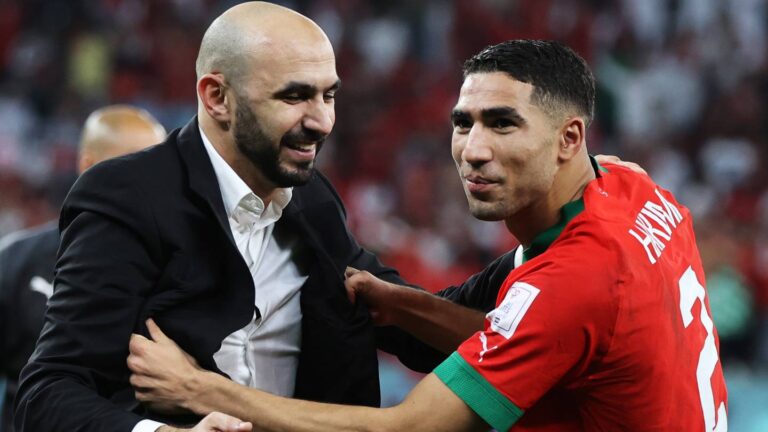
Achraf Hakimi answered the call on the pitch as, to a man, his team had done before. Off it, Walid Regragui did likewise. Literally.
“It’s extraordinary for a Moroccan to receive that call,” said the manager, moments after taking congratulations by phone from the King of Morocco, Mohammed VI.
“Extraordinary” pretty much summed up what had transpired at Education City Stadium and Morocco’s World Cup thus far. The North Africans had overcome Spain on penalties, a display of strength both in body and mind, to become the first Arab team to reach the quarter-finals of football’s showpiece tournament.
No wonder Regragui was soon chatting with the Moroccan monarch.
“He always encourages us, and he gives us advice and calls on us to give our all,” Regragui said. “His message is always the same: he is proud of the players, and he is proud of us.
“And as a result we want to go even further and do even better the next time.”
Doing even better would require some effort. But these Moroccans deal in endeavour, in a fortitude and a fearlessness that has carried them further in Doha than most anticipated.
On Tuesday night, noise pulsating around Education City, goalkeeper Yassine Bounou, better known as “Bono”, was inspired. Hakimi impudent. Bono saved two of Spain’s spot-kicks; Hakimi dinked the settler audaciously.
But before them, throughout the previous 120 minutes and the tournament’s two-and-a-half weeks, Morocco have been immense. Against Spain, Sofyan Amrabat and Azzedine Ounahi were tireless and tenacious in the middle, in the middle of everywhere, really; Romain Saiss a rock in central defence alongside the equally resolute Nayef Aguerd; Hakimi and Noussair Mazraoui each outstanding at full-back. Or the full length of their respective flanks.
Spain, for all their 77 per cent possession and 1,000-plus passes, had a solitary shot on goal. Morocco had plugged the gaps, pushed back the advancing Spaniards and rendered them redundant. They even had the clearer opportunities to seal it before the lottery of a shoot-out.
Post-match, Luis Enrique, the beaten Spain manager, singled out Ounahi – “the No 8” – because he knew already all about Amrabat.
“He didn’t stop running,” Enrique said. “He must be feeling destroyed.”
You could not fault Ounahi if he was. The entire team, to be fair. For Morocco’s might does take root in their pride in their shirt, their collective commitment to their cause. In their flag, their country, their people.
“For a national team like ours, the adrenalin and the pressure is so intense,” Regragui said afterwards. “You want to go down in history, but that takes up a lot of energy.
“When you have a heart, energy and love,” he added, “you win matches.”
That should not mask Morocco’s considerable talent, though. They are not among the final eight sides at a World Cup purely on conviction alone. They are tactically disciplined, organised to an extent that belies Regragui’s few months in the job – they have conceded once all tournament: Aguerd’s own goal in the win against Canada – and have the technical quality to trouble the best teams in Qatar.
Hakimi is a star among a sea of them at Paris Saint-Germain; Mazraoui plies his trade with Bayern Munich. Hakim Ziyech, another example of Regragui’s man-management that is married to obvious tactical acumen, for Chelsea of the Premier League. Amrabat in Serie A, with Fiorentina. Bono and striker Youssef En-Nesyri, another success story of this World Cup, with Spain’s Sevilla.
Morocco v Spain player ratings
AFP
In beating the Spanish, Morocco proved the group-stage draw with 2018 runners-up Croatia, and the victory against world No 2 Belgium, were no flukes. This was no minnow having their day while their opponents were off. Add the 2010 world champions to the list. A penny for Portugal’s thoughts?
These are unprecedented times, for Morocco and for the Arab footballing world who in the immediate aftermath of Tuesday united behind this most united of sides. In the press conference following Spain, a journalist took the microphone, but announced he did not have a question.
Speaking directly to Regragui and Bono, the reporter said: “I just want to thank you because today 40 million people are happy. I’m speaking with tears in my eyes because you have made Moroccan history.”
Arab history, as well. Before winger Sofiane Boufal stepped out of the stadium to a cacophony of cheers and chants, to the incessant sound of car horns blaring all around Doha long into the night, he shared the victory with those who had evidently embraced it as if one of their own.
“Thanks to all the Moroccans all over the world for their support, to all Arab people, to all Muslim people,” Boufal said. “This win belongs to you.”
And it genuinely felt it. A World Cup dominated on the pitch by Mbappe and Messi – and now by Morocco, too.
Updated: December 07, 2022, 2:14 PM